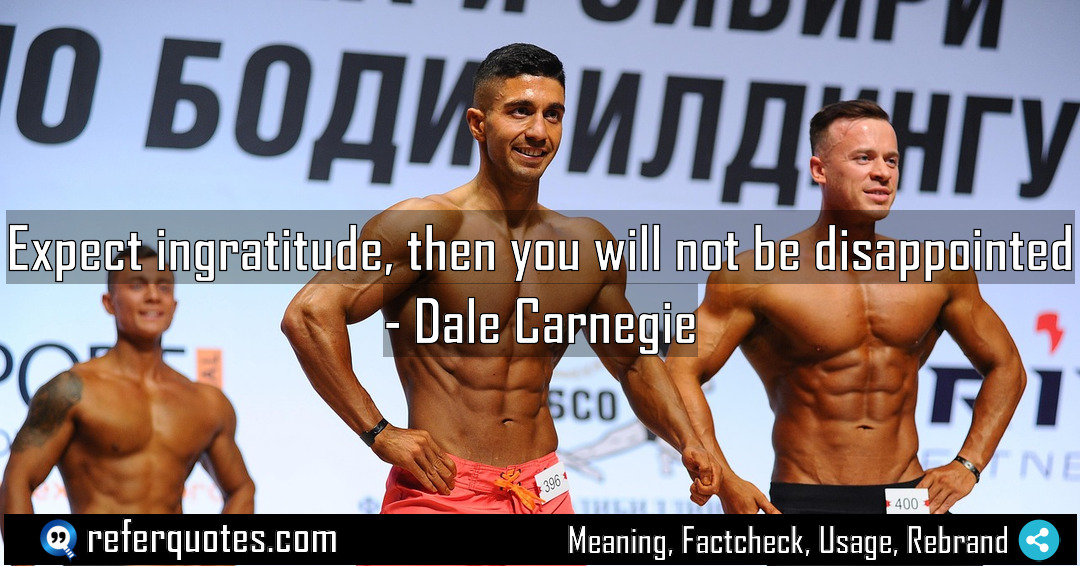Expect ingratitude, then you will not be disappointed. It’s a simple but profound mental shift that protects your peace and changes how you operate in the world.
Share Image Quote:Table of Contents
Meaning
The core message is about emotional self-defense. By lowering your expectations of others’ gratitude, you inoculate yourself against the resentment and frustration that comes when you feel your efforts aren’t appreciated.
Explanation
Look, I used to burn out all the time because I’d go the extra mile for a client or a colleague, expecting a big “thank you” or some recognition. And when it didn’t come? I’d be stewing for days. This quote flipped that for me. It’s not about becoming cynical or stopping kindness. It’s about changing your internal accounting system. You do the good thing because it’s the right thing to do, period. The reward is in the action itself. If gratitude comes, it’s a wonderful bonus. A delightful surprise. This mindset, honestly, it’s freedom. It stops you from keeping score and frees up so much mental energy.
Quote Summary
| Context | Attributes |
|---|---|
| Original Language | English (3668) |
| Category | Wisdom (385) |
| Topics | expectation (16), gratitude (64) |
| Literary Style | plain (102) |
| Emotion / Mood | realistic (354) |
| Overall Quote Score | 54 (15) |
Origin & Factcheck
This is correctly attributed to Dale Carnegie in his 1948 classic, “How to Stop Worrying and Start Living.” You’ll sometimes see similar sentiments floating around misattributed to Stoic philosophers like Marcus Aurelius, and while the *idea* is very Stoic, this specific phrasing is pure Carnegie, born from his work on American interpersonal dynamics in the mid-20th century.
Quote Summary
| Context | Attributes |
|---|---|
| Original Language | English (3668) |
| Category | Wisdom (385) |
| Topics | expectation (16), gratitude (64) |
| Literary Style | plain (102) |
| Emotion / Mood | realistic (354) |
| Overall Quote Score | 54 (15) |
Context
In the book, Carnegie isn’t teaching this as a way to be cold. He places it squarely in the section about finding peace of mind and avoiding fatigue and worry. He argues that one of the biggest sources of wear and tear on a person is resentment, and much of that resentment springs from expecting gratitude and not getting it.
Usage Examples
So, who is this for? Honestly, almost everyone, but let me give you some concrete scenarios.
- For Leaders & Managers: You mentor a junior employee, putting in hours of your time. You do it to build them up, not for a thank-you note. If one comes, it’s great. If not, you’re not emotionally derailed. Your motivation remains intrinsic.
- For Parents: You sacrifice for your kids constantly. Applying this principle means you don’t hold it over their heads. You do it out of love, freeing yourself from the disappointment when they, as kids do, take it for granted.
- For Creators & Entrepreneurs: You put out a fantastic piece of content or a product. You can’t be attached to the applause or the glowing reviews. You create value for its own sake. The positive feedback is just icing on the cake.
To whom it appeals?
| Context | Attributes |
|---|---|
| Theme | Wisdom (1754) |
| Audiences | caregivers (30), managers (441), teachers (1125), volunteers (30) |
| Usage Context/Scenario | caregiver support groups (2), people management trainings (2), school staff meetings (2), volunteer orientations (4) |
Share This Quote Image & Motivate
Common Questions
Question: Doesn’t this make you cynical and stop you from being kind?
Answer: It’s the exact opposite, in my experience. It purifies your kindness. When you remove the expectation of a reward, your actions become more authentic. You’re kind because you choose to be, not because you’re fishing for a specific reaction.
Question: How is this different from just having low expectations for everything?
Answer: Great question. This is a surgical tool, not a blanket philosophy. You should have high expectations for your own performance and standards. This is specifically about your expectation for *other people’s emotional responses*, which you cannot control.
Question: What if I’m in a relationship where I genuinely feel taken for granted?
Answer: This quote is a mental framework, not a substitute for healthy communication. It helps you manage your initial reaction, but if there’s a persistent pattern, it’s a signal to have a calm conversation about needs and appreciation, not just silently endure.
